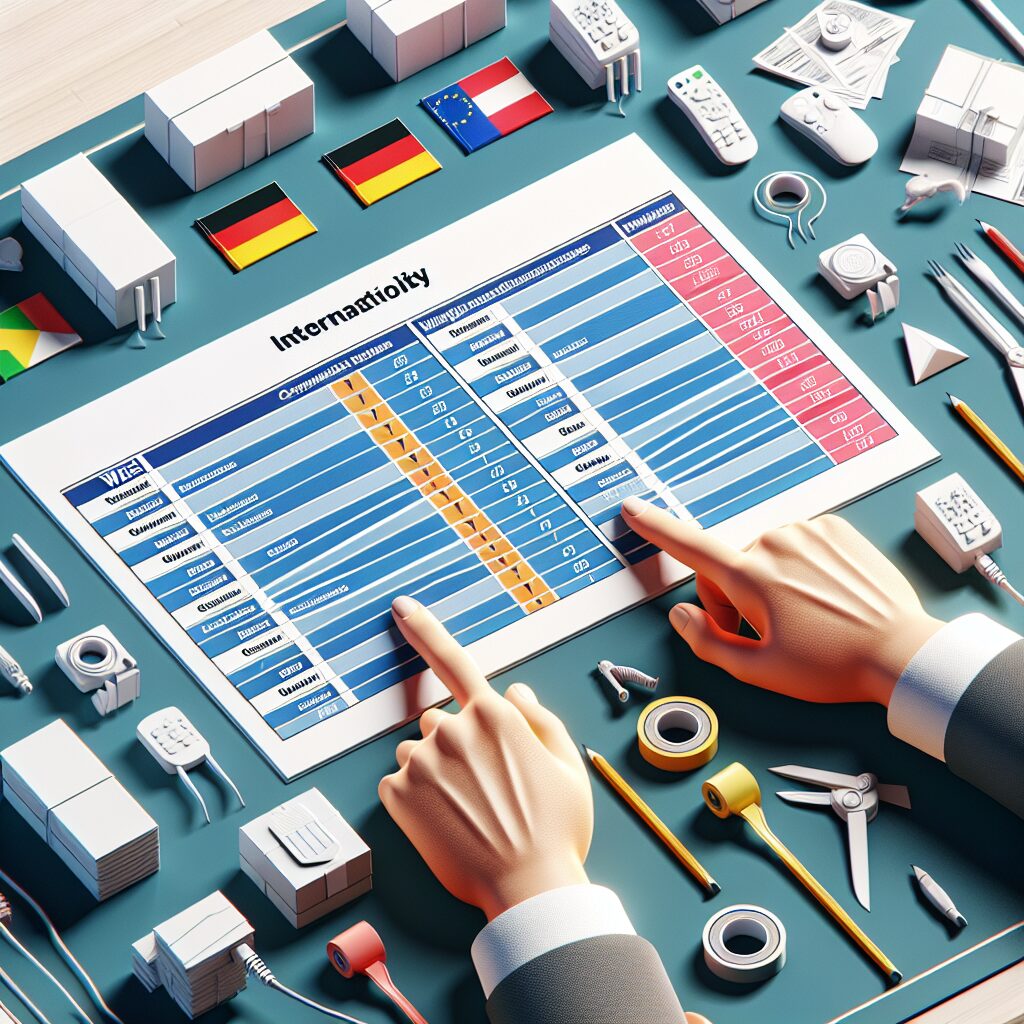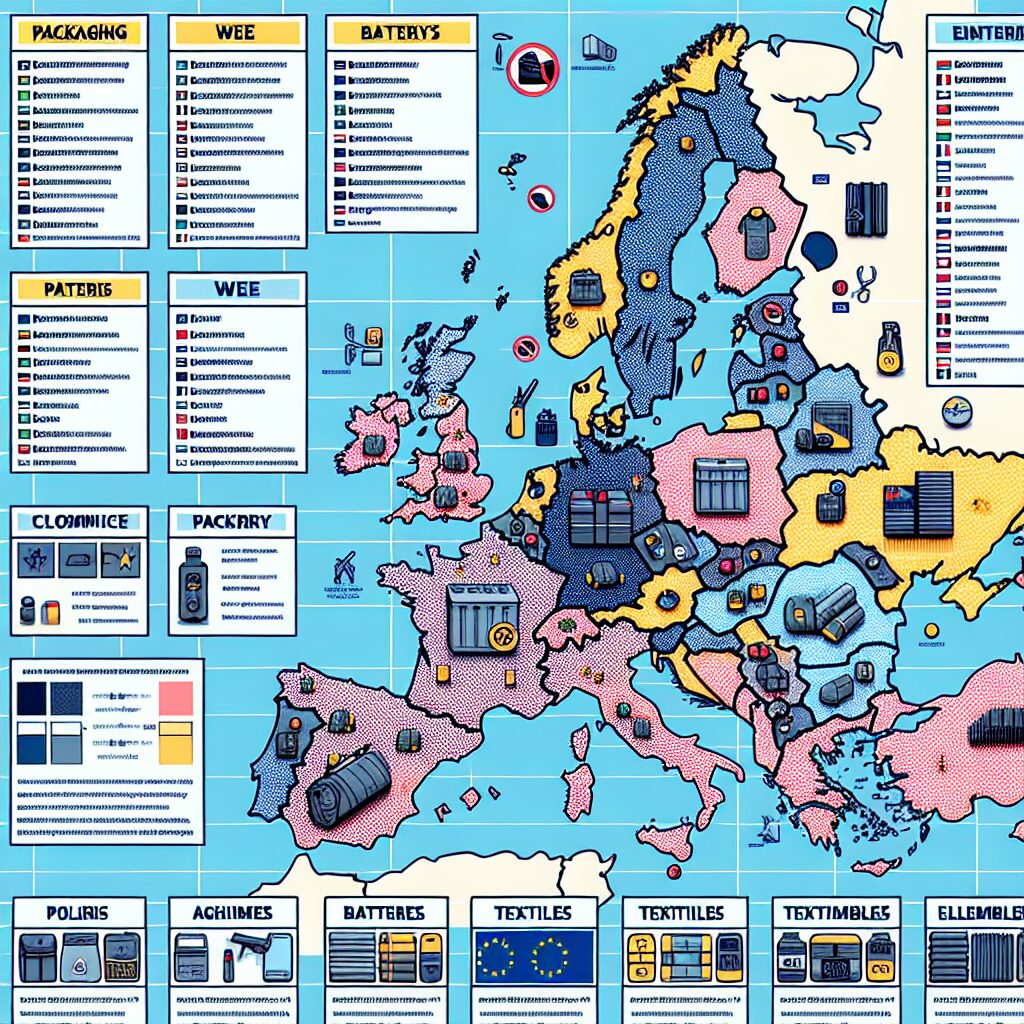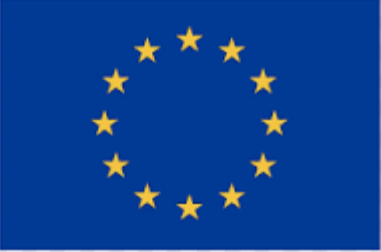About eldris
epr.eldris.ai leads the EPR sector, in fast, automated, AI Agent EU Complaince. LUCID Packaging, WEEE, and Battery Compliance for Brands, E-Commerce and Service based businesses expanding into the EU.
In This Article
- WEEE Spain Compliance applies to all companies selling EEE in Spain, including foreign sellers via e-commerce.
- Producers must register with the official national registry and coordinate with approved PROs.
- Annual and quarterly reports must include accurate product classification and weights.
- Fees depend on device type, weight, and environmental impact—expect higher costs for harder-to-recycle devices.
- AI tools help producers manage classification, tracking, and obligation filings more efficiently.
- Exporters must obtain a WEEE compliance certificate before sales can legally begin.
- Eldris provides one-stop compliance automation and legal support tailored to exporter needs.
- Regulatory shifts demand careful calendar alignment and continuous education to avoid penalties.
Spain’s 2025 WEEE EPR Rule Changes
Understanding the New Compliance Landscape
The new legislative amendments under the WEEE Spain Compliance framework form part of Spain’s broader ambition to tighten environmental controls and improve producer accountability. As of January 2025, Spain’s Ministry for the Ecological Transition has introduced stricter criteria regarding producer registration, declaration accuracy, and environmental responsibility. Companies that place Electrical and Electronic Equipment (EEE) on the Spanish market—including distance sellers—must now meet broadened documentation and reporting standards aligned with updated European Union directives.

One of the most notable aspects of the 2025 update is the requirement for all WEEE returns and costs to be traceable under a centralised digital infrastructure. This places a significant emphasis on system interoperability and data reliability across all stakeholders. The changes aim to close loopholes in compliance practices while leveraging technology to monitor and enforce EPR duties more effectively.
Who Qualifies as a Producer in Spain?
Criteria for EPR Obligations
Under the revised WEEE Spain Compliance criteria, a “producer” is defined far beyond the traditional concept of a manufacturer. Any entity that professionally manufactures, imports, sells, or remotely supplies EEE directly to Spain—regardless of location—falls within this definition. This includes companies utilising online marketplaces, e-commerce websites, or third-party logistics partners.
Furthermore, the inclusion of foreign businesses means that companies not physically located within Spain must still fulfil EPR duties if they target the Spanish market. For such businesses, appointing an authorised representative within Spain becomes mandatory, ensuring national accountability and streamlined data reporting. The revised scope ensures no economic actor bypasses environmental duties due to technicalities of digital trade.
Mandatory Spain EPR Registration Steps
Working with Authorized PROs
Under Spain’s 2025 WEEE Spain Compliance obligations, producers must register with the Registro Integrado Industrial (RII-AEE) before placing any applicable products on the market. This central government register is the official legal system tracking producer updates, product types, and associated weights imported annually.
One critical component of the registration process is affiliating with an authorised Producer Responsibility Organisation (PRO). PROs are legal entities accredited by the Spanish government to manage WEEE collection, recycling, and reporting on behalf of producers. These organisations offer strategic guidance, can handle physical recovery logistics, and ensure formal documentation submission to the Ministerio para la Transición Ecológica.
Partnering with a certified PRO accelerates compliance and ensures accurate classification of product categories in line with Royal Decree 110/2015, amended in 2023. Relying on PRO expertise avoids common misclassifications, which are among the leading triggers of non-compliance penalties.
WEEE Fee Structures & Calculation
Cost Estimation and Fee Categories
Part of achieving WEEE Spain Compliance involves proactively budgeting for producer fees. In Spain, WEEE-related fees are calculated based on the product’s lifecycle impact, weight, and device category. These categories include temperature exchange equipment, screens, lamps, and small/large IT and telecommunications devices, among others.
Each PRO or compliance scheme maintains slightly different fee tables; however, all fees are based on ecological metrics such as recyclability, pollution potential, and waste processing costs. For instance, equipment with lithium batteries or hazardous substances increases disposal complexity and, consequently, compliance fees.
Fees are typically collected quarterly or bi-annually and reflect declarations made in corresponding registration filings. Notably, companies will need proper inventory tracking systems to segregate declared weights by product type. Misreporting weight or product codes can result in retroactive fines. Software-based tracking solutions and integration with invoicing systems help ensure accurate declarations and fee audits by authorities.
WEEE Reporting Obligations in Spain
Data Submission and Annual Filings
Beyond initial registration, producers are bound by ongoing WEEE Spain Compliance obligations. Chief among them is annual reporting, which involves the submission of national returns to the competent authority. These reports must detail every kilogram of equipment placed on the market across categories, units sold, and geographic spread—accounting as well for device type and collection contributions.
Reporting timelines run on a calendar-year basis. Producers must submit declarations between January and March of the following year. Documentation must be validated by third-party auditors or compliance agents, particularly for larger organisations exceeding annual turnover thresholds of €1 million.
Additionally, reports must align with data submitted by PROs. Discrepancies can trigger inspections or non-compliance designations, which may lead to suspension from the Spanish market. Leveraging digital ledger tools and advanced artificial intelligence modules substantially reduces error margins and ensures legally acceptable data integrity.
Common Compliance Mistakes Exporters Make
Top Pitfalls and How to Avoid Them
Despite the clarity of regulation, many exporters still struggle with WEEE Spain Compliance due to common procedural errors. One major pitfall is delayed registration—many companies begin market penetration campaigns before registering with the RII-AEE or contracting a PRO. This delay may incur retroactive fines or product recalls.
Another frequent mistake involves improper product classification. Misidentifying an item as a non-EEE product can nullify previously submitted reports, creating the need for overdue corrections. Relying solely on internal teams without EPR expertise often leads to such oversights.
Additionally, poor recordkeeping hinders proof of compliance. Several firms fail to maintain updated declarations, sending incomplete data or non-certified reports. This restricts the PER integration capabilities and undermines traceability requirements, especially for high-value electronics sold online.
Automating Spain WEEE EPR Compliance
AI Solutions and Software Tools
Automation plays an increasingly vital role in fulfilling WEEE Spain Compliance obligations. Modern EPR software platforms now offer intelligent dashboards integrating inventory systems, invoicing outputs, and packaging data in real-time. These platforms cross-reference declared product codes with scheduling calendars to prompt legally compliant submission windows.
AI modules powered by natural language processing also enable realtime classification support. A company entering new SKUs can rely on machine intelligence to sort items into over 20 WEEE designations, flagging anomalies or uncertainties before formal submission. Such pre-validation functions significantly decrease human error.
Most European compliance tools support Spanish regulatory templates, reducing manual data entry. Integration with PRO systems such as ERP platforms, logistics workflows, and e-commerce APIs ensures enterprise-level compliance with minimal effort. Learn more about EU Compliance Regulations for Producers
How to Get Your Spain WEEE Certificate
Verified Documentation & Timelines
Receiving a valid Spain WEEE compliance certificate is the final step after accurate registration, PRO association, fee settlement, and initial reporting. The certificate is issued by the PRO or via the national registry, and confirms a producer’s legal ability to trade EEE products in Spain without restrictions.
Most certificates are issued within 6–8 weeks following the successful confirmation of registration and product submission categories. It is advisable to begin preparations at least three months in advance of market entry to avoid critical delays in launch timelines.
Certificates are renewable annually and require updated proof of fee payments and yearly declarations. Non-renewal results in automatic deregistration from the RII-AEE platform and a halt in commercial rights to distribute EEE products in Spain. Read a related article
How Eldris Helps Exporters Stay EPR-Compliant
Features and Service Breakdown
Eldris supports exporters through comprehensive WEEE Spain Compliance solutions. Its end-to-end subscription product offers automated classification, PRO liaison, document retrieval, and real-time reporting dashboard all in one place. By integrating directly with customs software and fulfilment systems, Eldris guarantees seamless data flows that meet Spanish Ecoembes and EEE directives.
Furthermore, Eldris clients gain access to a multi-lingual team of EU regulatory consultants. These experts resolve classification disputes, audit suspicious returns, and prepare deadline-tracked to-do lists aligned with Spain’s regulatory calendar. All documentation is stored on EU-certified cloud servers for redundancy and security.
By combining digital efficiency with legal accuracy, Eldris ensures that emerging and large-scale exporters alike remove the stress from sustainability compliance. Build consumer trust with localized Shopify storefronts in Germany
Resources for Spain EPR Support
Regulations, PROs, and Checklists
Staying updated is crucial to long-term WEEE Spain Compliance. Useful resources include official government guidelines from the Ministerio para la Transición Ecológica, PRO directories, and updated checklists categorised by device family and product codes.
Other helpful documents include the 2023 revision of Royal Decree 110/2015, WEEE Europe standards harmonisation tables, and Spain’s national e-waste plan outlining annual strategic targets. Subscription to monthly regulatory bulletins also helps anticipate upcoming rule adaptations, technological integrations, and enforcement protocols of note.
“WEEE Spain Compliance isn’t just legislative—it’s a strategic market enablement path that benefits the environment and ensures your business scales responsibly.”
Key Takeaways for Spain WEEE EPR 2025
Spain’s revised 2025 WEEE Spain Compliance framework elevates the complexity and importance of EPR obligations for all producers selling EEE products in the Spanish market. From precise registration and fee categorisation to automated reporting and certification, each step must now be integrated into business operations across planning, logistics, and sustainability functions.
Great guide on spain-epr-for-weee-2025-producer-duties-and-fees-explained – Community Feedback
What is the EPR regulation in Spain?
Spain’s EPR (Extended Producer Responsibility) regulation, effective from June 2025, introduces required producer duties for waste management, especially for electronics and certain product categories, aligning with wider EU sustainability objectives.
How to register EPR Spain?
To register for EPR in Spain, producers must sign a contract with a responsibility organization (PRO), which then submits an application to MITECO to receive an EPR registration number.
Who pays for EPR?
Producers placing products on the Spanish market bear the full financial responsibility for managing waste, including fees associated with collecting, sorting, and recycling at end of product life.
What are the obligations of EPR?
EPR obligates producers to finance the complete waste management process – collection, sorting, treatment, and recycling, effectively shifting costs from taxpayers to product manufacturers.










